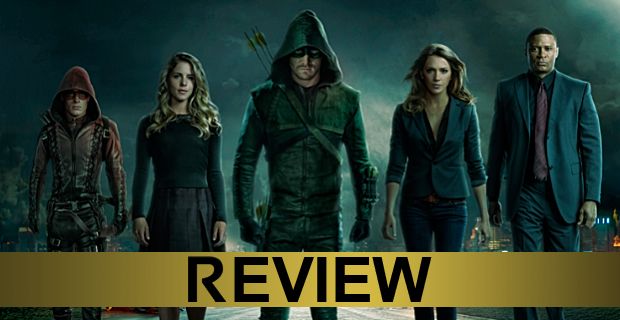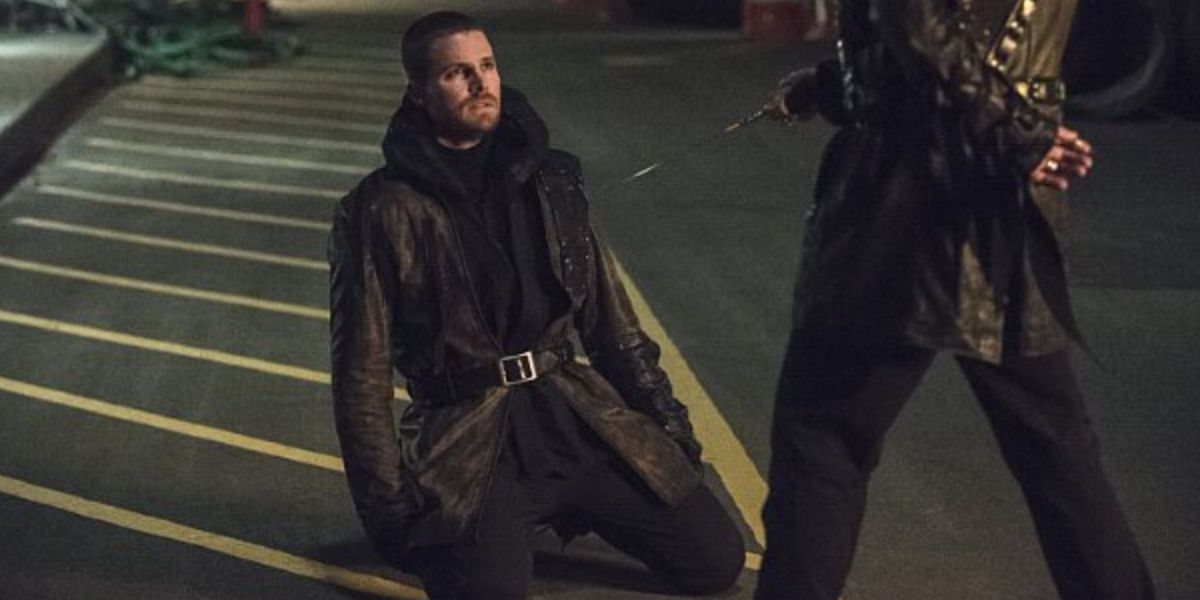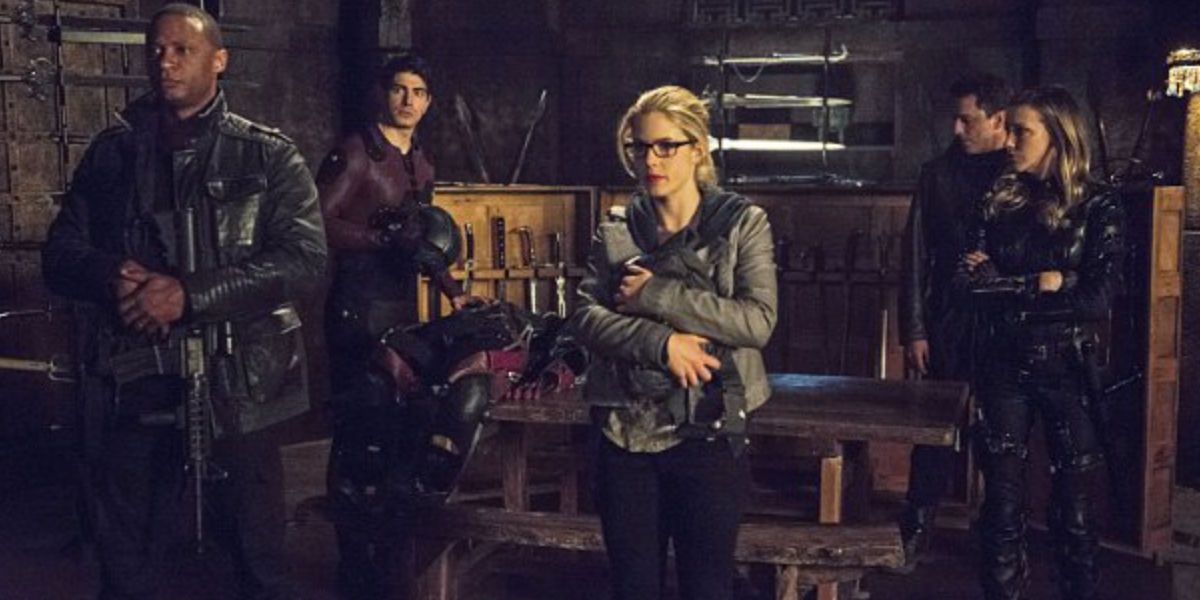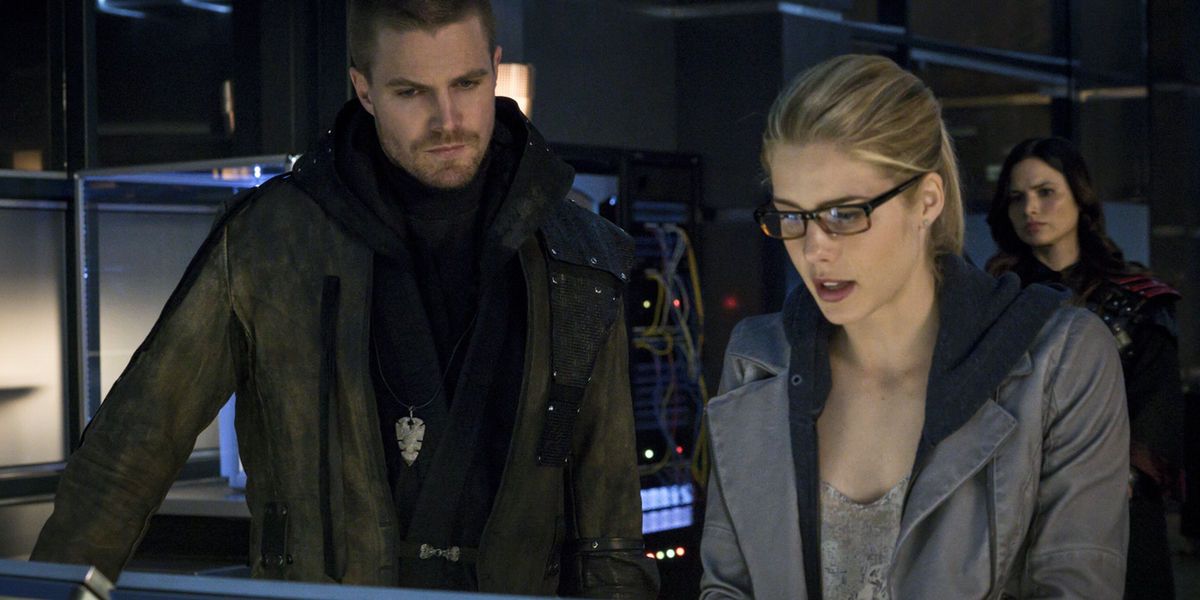[This is a review of Arrow season 3, episode 23. There will be SPOILERS.]
-
Over the past three seasons, the cast of Arrow has grown considerably larger. What started out as a show about one man's very pointy crusade against crime and corruption in his city has now turned into a full-fledged movement. By the time season 3 rolled around, Oliver Queen's one-man operation was a team effort. As such, the needs of Team Arrow and its members sometimes take precedence over the story at hand. The result, then, gives you a season (and a season finale) wherein the machinations of an antagonist like Ra's al Ghul are often asked to take a backseat to the emotional development and maintenance of the characters that make up the ensemble.
Concentrating the focus in such a way can work, and it has worked before. And to a certain extent it worked in 'My Name is Oliver Queen', which managed to put the focus on Oliver's seemingly shattered relationship with Team Arrow, while also delivering the kind of intense, epic finale we have come to expect from Arrow, especially after the series high note that was season 2's 'Unthinkable'.
But as good as it is in places, the season 3 finale doesn't quite reach the same heights set by the show's sophomore season. And that has to do with the season's main villain. For all the clout Ra's al Ghul holds in the DC Universe, his potential never felt entirely realized on the show. To his credit, Ra's did what no one before him was able to do: he seemingly killed Oliver Queen. That certainly sent his villain stock shooting through the roof, but after the midseason premiere, the character of Ra's wasn't able to grow beyond that one feat. He instead became a symbol of the patriarchy, the past, and pitfalls of being beholden to ritual – all things that have considerable thematic and storytelling appeal, so long as they can be tied into the rest of the narrative. Here, they felt somewhat incongruous, or, at the very least, underdeveloped.
Ra's wasn't able to become the kind of rich, textured villain Slade Wilson was. Perhaps it was because season 2 gave Slade equal time in both the present day storyline and the flashbacks that he was able to become such a well-developed character; one whose motivations and methods – although a touch on the insane side – resonated throughout the season's thematic core.
For his part, the Demon's Head began in much the same way. Thematically, Ra's stood as the threat – or promise – of what Oliver could one day become, if he were unable to reconcile the two halves of his identity. Ra's was intended to be the twisted representation of what an amalgamation of Oliver and the Arrow might look like. In fact, that became a part of the appeal of the League of Assassins – the promise that it might make Oliver whole, but at what cost? And while the latter half of the season succeeded in showing how an Oliver in league with the League could (and did) jeopardize his relationships with important characters like Diggle and Felicity, it never felt as though it was a decision Oliver was struggling with internally. Instead, it was all just part of his plan to foil the external threat that was Ra's al Ghul.
And for a season that was all about identity, there just wasn't enough of a sense that Oliver was wrestling with a decision of who he wanted to be. The character told us (and Felicity) several times that he couldn't be both Oliver Queen and the Arrow, but that internal struggle never came through onscreen - beyond a few glimpses of him pining for a potential lover, who had moved on to the admittedly more stable Ray Palmer.
What there was enough of, thankfully, was the development of the larger Team Arrow crew – which included some interesting shakeups in the final moments of the episode. In a sense, it feels as though that coda in which Oliver seemingly retires, while leaving the security of Starling City in the capable hands of the new and improved Team Arrow, was what the finale was aiming for all along. That is indicative of an increasingly common drawback to developing a shared universe: the sense that every story is essentially always setting up something new – Legends of Tomorrow, among others – while the main thrust of the narrative is then wrapped up in a fashion that feels too rushed.
That certainly felt like what was going on here, since Ray Palmer's technology was able to quell the threat of the bioweapon with relative ease, while Oliver set off toward what should have been an epic rematch. The fight itself was terrific, as the stunt department on Arrow continues to be the best on television, but there were so many different implications to the battle and its inevitable outcome that the episode simply didn't have the time or resources to touch upon them all in a completely fulfilling way. Oliver's return to killing, though necessary, felt almost perfunctory. It didn't carry the weight of what a decision like that should have carried, considering the amount of time the series has devoted to his transition from a hero who kills to one who doesn't.
Then there's the matter of Damian Dark, who doesn't even show up, but instead acts as a brief plot device - one that, like so many other things in the finale, serves the upcoming plotline of season 4, rather than the conclusion to season 3. Diggle heads off on his own, Ray blows up the top floor of his building, Thea becomes Speedy (although she prefers Red Arrow), and Malcolm is gifted the status of Ra's al Ghul (much to the chagrin of Nyssa, who I thought was a shoo-in for the position). There's a lot going on, but unfortunately very little of it means anything to the story at hand.
In the end, though, Oliver gets his happy ending, and in that we can glean considerable satisfaction. Even though we know he will be back under the hood soon enough, seeing him and Felicity driving off into the sunset felt like the ending the season needed. Rather than build anticipation for what comes next by overtly teasing it, the Oliver-Felicity excursion to who knows where actually concludes the current storyline. Those two endings – one for Oliver and one for each of the increasingly large ensemble – feel like the finale and the season as a whole: A mixed bag of half-met potential buttressed by some truly stellar moments.
-
Arrow will return for season 4 in the fall of 2015 on The CW.




